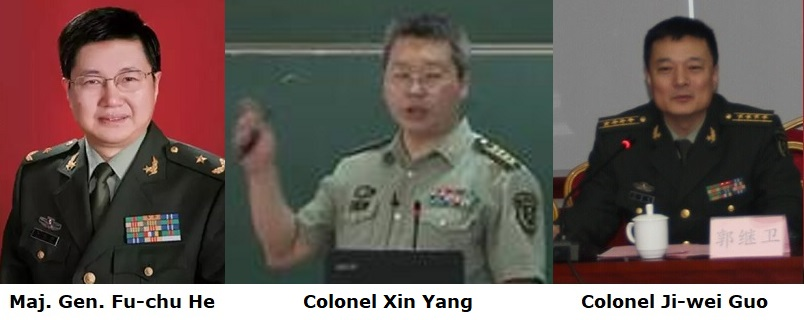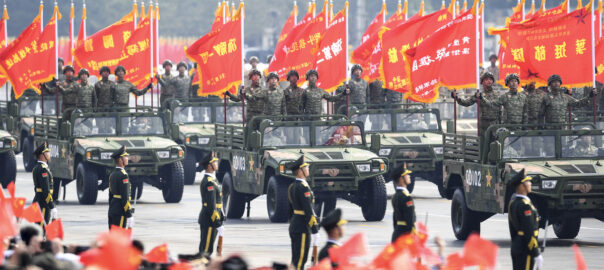By Lawrence Sellin and Anna Chen | October 30, 2021
On February 14, 2020, General Secretary of the Chinese Communist Party and Chairman of the Central Military Commission, Xi Jinping, emphasized the need to incorporate biosecurity into China’s national security system.
In China, biosecurity is a euphemism for “bio-based war” because so much of Chinese military doctrine is devoted to the offensive use of biotechnology.
The 2011 version of “Chinese People’s Liberation Army Military Language” provides the following definition:
Biological warfare refers to the use of biological weapons to injure humans and animals and destroy crops. It was formerly called germ warfare. In combat, biological warfare agents are used in various ways to cause epidemics in the opponent’s army and the rear area, and large areas of crops are necrotic, so as to achieve the purpose of weakening the opponent’s combat effectiveness and destroying its war potential.
But China’s military distinguishes between traditional biological warfare and “bio-based war” using “military biotechnology.”
In his 2012 article “Development of military biotechnology and the future of bio-based war,” Major General Fu-Chu He wrote:
In future wars, military biotechnology will promote the bio-based weaponry and equipment, bio-based forces and bio-based combat style.
It is important to note that Major General Fu-Chu He was President of the Academy of Military Medical Sciences, Vice President of China’s Academy of Medical Sciences, an Alternate Member of the 18th Central Committee of the Chinese Communist Party and Vice Director of Scientific and Technical Committee affiliated to Central Military Commission, which is China’s equivalent of the U.S. Department of Defense’s DARPA, the Defense Advanced Research Projects Agency.
That is, Major General Fu-Chu He was Xi Jinping’s closest military advisor on matters of “biosecurity.”

The distinction between bio-based war and biological warfare was described in a November 9, 2020 article by retired Colonel Xin Yang, who is a professor in the Department of Military Teaching and Research at Nanjing University.
Colonel Yang views general biological war using traditional bioweapons as having many of the same limitations as nuclear warfare in terms of their potential widespread destructive power.
He prefers the scalpel of bio-based war to the sledgehammer of biological warfare.
Aspects of bio-based war include:
Micro-attack: “Nonlethal” bioweapons is a concept that runs through recent Chinese military doctrine. That is, bioweapons that do not kill humans, animals and plants or attack them at the macroscopic level, but destroy the structure and physiological functions of humans, animals and plants via microscopic molecular structures and functions.
Moderated conquest: Instead of killing the enemy, bio-based warfare agents can temporarily disable the enemy and prevent participation in war or kill and injure by specific race or ethnicity in a limited way using genetic bioweapons.
Biotechnology-information technology superiority: Greatly increase China’s military superiority and deterrence level by fusing information-based warfare with bio-based war using advanced biotechnologies.
Bio-based war operational approaches: Citing the SARS 2002-2004 and COVID19 pandemics as examples, the secret initiation of epidemics during war to reduce the enemy’s fighting capability or in “pre-war” situations to prevent potential adversaries from mobilizing effectively on the eve of war.
Vaccines as bio-based weapons: Vaccines with “backdoors” can be bio-based warfare vectors present as biological time bombs once inside the body or creating vulnerabilities to future bioweapon attacks. The introduction of such “backdoor” vaccines into the U.S. population is especially risky in inadequately regulated joint vaccine production ventures between Chinese and U.S. pharmaceutical companies, not unlike the introduction of Chinese surveillance capabilities inside Chinese instrumentation and software deployed in the United States.
The above-described developments are not occurring in isolation. People’s Liberation Army Colonel Ji-Wei Guo’s 2010 book “Bio-based war—Reconfiguring Military Strategy for a New Era” highlights the necessity for integrating information warfare with bio-based war to manipulate a disease outbreak or pandemic using propaganda, spread disinformation and create chaos and fears, all elements of the COVID-19 experience.
That and other approaches supporting bio-based war have been incorporated in the 2021 Chinese Communist Party’s 14th Five-Year Plan, which mandated the fusion of the biotechnology and information technology research sectors, in particular, artificial intelligence, as well as the massive collection of human genetic (DNA) information into China’s databases from both Chinese people and internationally.
The “success” of the People’s Liberation Army’s first-generation, bio-based warfare agent, COVID-19, has only accelerated China’s military ambitions.
Lawrence Sellin, Ph.D. is retired U.S. Army Reserve colonel and a veteran of Afghanistan and Iraq. He had a civilian career in international business and medical research. His email address is lawrence.sellin@gmail.com. Anna Chen can be followed on Twitter @2020Gladiator
